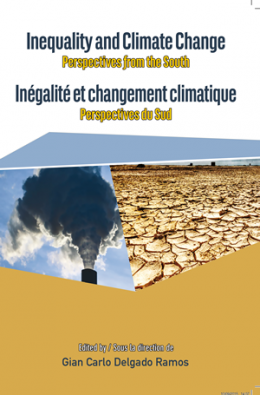Inequality and Climate Change: Perspectives from the South
Synopsis
CODESRIA, 2015, 204p., ISBN : 978-2-86978-645-5
Sous la direction de Gian Carlo Delgado Ramos
Climate change is one of the most pressing challenges of the twenty-first century. Anthropogenic activities, such as fossil fuel consumption and other activities focused on enhancing economic growth, have been identified as the main drivers of changes in the environment that defy planetary boundaries. The transgression of planetary boundaries has profound implications for practically all biophysical and human systems and their impact could also be related to the exacerbation of existing problems such as land tenure insecurity, poverty and inequality, marginalization of poorer populations, climate induced migration, and resource wars or conflicts. From a global-South point of view, research on the multifaceted nature of climate change is thus necessary and appropriate, including the analysis of socioeconomic, political and cultural aspects. This book is an outcome of the Comparative Research Workshop on “Inequality and Climate Change: Perspectives from the South” of the South-South Collaborative Programme of CLACSO-CODESRIA-IDEAS. It gathers a diversity of case studies from the South with ample biophysical differences and particular social and cultural realities. As such, it is a fresh contribution offering a vantage point from which to examine some of the current perspectives on inequality and climate change.
Gian Carlo Delgado Ramos graduated with a degree in economics from the National Autonomous University of Mexico (UNAM), before proceeding to the Autonomous University of Barcelona, Spain, for his master’s and doctoral studies in Ecological Economics, Environmental Management, and Environmental Sciences. He is a full time researcher on “City, Management, Land and Environment” program of the Interdisciplinary Research Centre on Sciences and Humanities at UNAM. He is also member of the National Research System of the National Science and Technology Council (CONACYT), Mexico. He is the recipient of the Mexican Academy of Sciences Research Prize on Social Sciences – 2014 and the National University Prize for Young Researchers – 2011.
Chapitres
-
Inequality and Climate ChangeInégalité et changement climatique
-
Prelim
-
INTRODUCTION
-
The Socioeconomic Implications of Renewable Energy and Low Carbon Trajectories in South Africa
-
Les migrants climatiques en quête d’adaptation :les éleveurs Mbororo émmigrent en Rd Congo
-
Changements climatiques, genre, et inégalités sociales: les praticiennes de la médecine et de la pharmacopée traditionnelle en milieu urbain au Burkina Faso
-
Saint-Louis du Sénégal, les « aventuriers » de la terre
-
A New Cartography of International Cooperation: Emerging Powers in Sub-Saharan Africa – The Case of Biofuels Promotion by Brazil in Senegal
-
Climate Change and the Urban Political Ecology of Water
-
Indigenous People and Climate Change:Causes of Flooding in the Bolivian Amazon and Consequences for the Indigenous Population
-
Gender-wise Rural-to-Urban Migration in Orissa, India: An Adaptation Strategy to Climate Change
-
Effects of Climate Change and Heat Waves on Low Income Urban Workers: Evidence from India
Téléchargements






